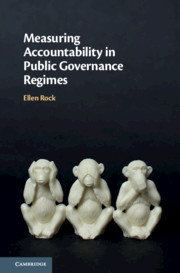Book contents
- Measuring Accountability in Public Governance Regimes
- Measuring Accountability in Public Governance Regimes
- Copyright page
- Dedication
- Contents
- Foreword
- Acknowledgements
- Table of Cases
- Table of Statutes
- Introduction
- Part I Accountability Deficits and Overloads
- Part II Benchmark of Accountability
- 3 Five Rationales for Accountability
- 4 Who Should Be Held Accountable?
- 5 To Whom Should They Be Accountable?
- 6 For What Should They Be Accountable?
- 7 How Should They Be Held Accountable?
- 8 Defining and Deploying a Benchmark of Accountability
- Part III The Complexity of Accountability Systems
- Conclusion
- Bibliography
- Index
4 - Who Should Be Held Accountable?
from Part II - Benchmark of Accountability
Published online by Cambridge University Press: 28 September 2020
- Measuring Accountability in Public Governance Regimes
- Measuring Accountability in Public Governance Regimes
- Copyright page
- Dedication
- Contents
- Foreword
- Acknowledgements
- Table of Cases
- Table of Statutes
- Introduction
- Part I Accountability Deficits and Overloads
- Part II Benchmark of Accountability
- 3 Five Rationales for Accountability
- 4 Who Should Be Held Accountable?
- 5 To Whom Should They Be Accountable?
- 6 For What Should They Be Accountable?
- 7 How Should They Be Held Accountable?
- 8 Defining and Deploying a Benchmark of Accountability
- Part III The Complexity of Accountability Systems
- Conclusion
- Bibliography
- Index
Summary
This chapter looks at the various choices that must be made in deciding who should be held accountable pursuant to an accountability mechanism. Some of the key difficulties discussed include the sheer size and complexity of modern government, particularly in a federal system; that government operations are increasingly performed via co-operation between different entities and individuals, making it difficult to pinpoint a ‘wrongdoer’; the increasing trend of privatisation and outsourcing; and underlying philosophical questions about our conception of government, including whether it should be treated as a corporate entity or a collection of individuals. Once those difficulties have been confronted, it is then necessary to make choices about what approach best suits the selected rationale(s) for accountability. For instance, the desert rationale might favour holding individual wrongdoers directly accountable, whereas the redress rationale might favour holding the government accountable as an entity on the basis that it is in a better position to provide an appropriate remedy.
Keywords
- Type
- Chapter
- Information
- Measuring Accountability in Public Governance Regimes , pp. 47 - 62Publisher: Cambridge University PressPrint publication year: 2020

